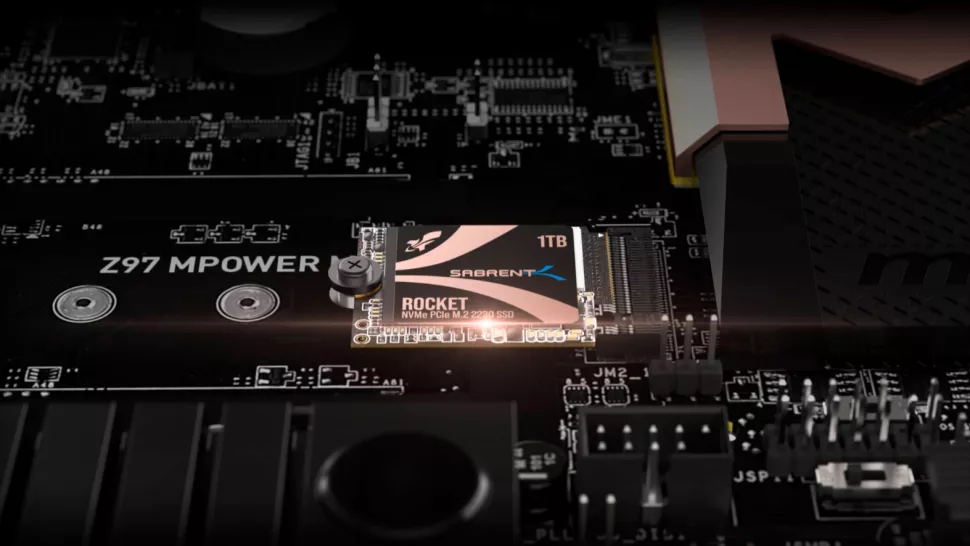Sabrent Launches 5 GB/s SSDs For The Steam Deck

Sabrent has revealed the company's new Rocket 2230 SSD, which will fight for a spot on the list of best SSDs. The Sabrent Rocket 2230, like its name implies, conforms to the M.2 2230 form factor and caters to compact devices, such as the Steam Deck, Microsoft Surface, ultrabooks, and Intel NUCs.
Due to the Steam Deck's design, the portable gaming console only accepts M.2 2230 SSDs, and there aren't many options on the market. One particular Steam Deck owner discovered a mod to slip longer SSDs, like the M.2 2242 ones, into the device. However, Steam Deck's designer warned against such hacks since they can provoke overheating issues on the Steam Deck and considerably shorten the consoler's life span. Sabrent's latest Rocket 2230 SSD makes upgrading the SSD inside your Steam Deck easier and safer.Read More : Micron sees dip in chip demand as PC makers face parts shortages The Rocket 2230 features a single-sided design to squeeze into the tightest places without hiccups. Sabrent's recipe for the Rocket 2230 includes Phison's spanking-new E21T SSD controller and Micron's 176-layer TLC NAND. Combined with a PCIe 4.0 interface, the Rocket 2230 can hit impressive speeds of up to 5 GBps. However, the performance varies on the capacity. Speaking of capacity, Sabrent sells the Rocket 2230 in flavors of 256GB, 512GB, and 1TB, so there's abundant space to store your data or games in the case of the Steam Deck.
The 256GB model has sequential read and write speeds up to 4,650 MBps and 1,900 MBps, respectively. The 512GB model allows 5,000 MBps sequential reads and 3,700 MBps sequential writes. The 1TB version is the highest-performing variant with sequential read and write speeds that hit 4,750 MBps and 4,300 MBps, respectively.
Regarding random performance, the 256GB SSD comes with 220,000 IOPS reads and 470,000 IOPS writes, whereas the 512GB SSD flaunts 440,000 IOPS reads and 920,000 IOPS writes. As for the 1TB version, it delivers random read and write performance of up to 450,000 IOPS and 545,000 IOPS, respectively.
Sabrent compared the brand's Rocket 2230 1TB SSD to the Kingston OM3PDP3512B-A01, which came inside one of the Steam Deck, with KDiskMark, an alternative to CrystalDiskMark. The Kingston drive had sequential read and write speeds of 2,427.26 MBps and 1,077.39 MBps, respectively. On the other hand, the Sabrent SSD delivered 3,530.6 MBps sequential read and 2,713.23 MBps sequential write. Therefore, the Rocket 2230 offered 45% higher sequential reads and 152% higher sequential writes.
Due to the Steam Deck's design, the portable gaming console only accepts M.2 2230 SSDs, and there aren't many options on the market. One particular Steam Deck owner discovered a mod to slip longer SSDs, like the M.2 2242 ones, into the device. However, Steam Deck's designer warned against such hacks since they can provoke overheating issues on the Steam Deck and considerably shorten the consoler's life span. Sabrent's latest Rocket 2230 SSD makes upgrading the SSD inside your Steam Deck easier and safer.
The 256GB model has sequential read and write speeds up to 4,650 MBps and 1,900 MBps, respectively. The 512GB model allows 5,000 MBps sequential reads and 3,700 MBps sequential writes. The 1TB version is the highest-performing variant with sequential read and write speeds that hit 4,750 MBps and 4,300 MBps, respectively.
Regarding random performance, the 256GB SSD comes with 220,000 IOPS reads and 470,000 IOPS writes, whereas the 512GB SSD flaunts 440,000 IOPS reads and 920,000 IOPS writes. As for the 1TB version, it delivers random read and write performance of up to 450,000 IOPS and 545,000 IOPS, respectively.
Sabrent compared the brand's Rocket 2230 1TB SSD to the Kingston OM3PDP3512B-A01, which came inside one of the Steam Deck, with KDiskMark, an alternative to CrystalDiskMark. The Kingston drive had sequential read and write speeds of 2,427.26 MBps and 1,077.39 MBps, respectively. On the other hand, the Sabrent SSD delivered 3,530.6 MBps sequential read and 2,713.23 MBps sequential write. Therefore, the Rocket 2230 offered 45% higher sequential reads and 152% higher sequential writes.
Source: www.tomshardware.com
Useful Links:
